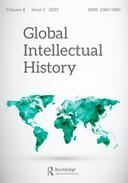Global intellectual history
Abbreviation:
Glog. Intell. Hist.
Published by:
Informa - Taylor and Francis Group
Publisher Location: Abingdon, OXF, England, UK
Journal Website:
https://www.tandfonline.com/loi/rgih20
Range of citations in the SafetyLit database:
2023; ePub(ePub) --
2023; ePub(ePub)
Publication Date Range:
2016 --
Title began with volume (issue):
1(1)
Number of articles from this journal included in the SafetyLit database:
1
(Download all articles from this journal in CSV format.)
pISSN = 2380-1883 | eISSN = 2380-1891
Find a library that holds this journal: http://worldcat.org/issn/23801883
Journal Language(s):
English
Aims and Scope (from publisher):
How can we define intellectual history? At present scholars who call themselves intellectual historians, or who express an interest in intellectual history, can be found working on a variety of topics, such as the history of identity, time and space, empire and race, sex and gender, natural and popular science, the body and its functions, the movements of peoples and the tranmission of ideas, the history of publishing and the history of objects, art history and the history of the book, in addition to the subjects traditionally associated with intellectual history, political theory, political economy and international relations. While Intellectual historians are at the forefront of the current global, transnational, comparative, spatial, visual, and international turns in the historical profession, its definition remains contested. John Burrow, the first person to hold a professorship in the subject in Britain, provided a notable definition of intellectual history as the process of recovering ‘what people in the past meant by the things they said and what these things ‘meant’ to them.’ Burrow warned that it is often the case that ‘academic labels are better thought of as flags of convenience than as names of essences’; but his definition is probably the best we have, as are the metaphors that he employed of the intellectual historian as an eavesdropper upon the conversations of the past, as a translator between the cultures identifiable today and those of the past, and of an explorer studying worlds full of assumptions and beliefs alien to our own.
The fluid identity of intellectual history may explain its success. Intellectual history is stronger than ever before at the time of writing. Intellectual historians can be found working in every academy and in every country across a large number of arts faculties. This has led to discussion of the practice of intellectual history in a global age and more particularly to the relationship between intellectual history and global history. David Armitage, for example, has argued that intellectual history is very well placed to deal with the most wide-ranging ideas over long spans of time and across cultures, coining the term ‘a history in ideas’ to describe such labour. Armitage makes the point that the assumption that intellectual historians deal only with specific ideological episodes in narrow and precise contexts is mistaken, as intellectual historians have always been interested in long-term change. At the same time, and as Moyn’s and Sartori’s edited collection Global Intellectual History underlines, intellectual historians can help in tracking the movement of ideas and their dissemination, and the transformation of ideas across borders and cultures. The result must not be a return to the study of those figures alone who have a global reputation, which is to focus on the peaks of the mountain while neglecting the foothills. The historian who has avoided these sins and has written what might be said to be a model for intellectual historians interested in global ideas is John Pocock. His Barbarism and Religion books cover the transmission of ideas across the Roman Empire and their history after the break-up of this empire, entailing the translation of arguments across the gigantic Eurasian land mass and their involvement across the Atlantic world and all the lands encompassing the British Empire at the end of the eighteenth century. Pocock has traversed traditional disciplinary boundaries, recovering lost arguments that crossed nations and continents, seeking to explain what they meant to new generations of people who have been schooled in national or narrower forms of history. It is this broader sense of intellectual history that inspires this new journal.
